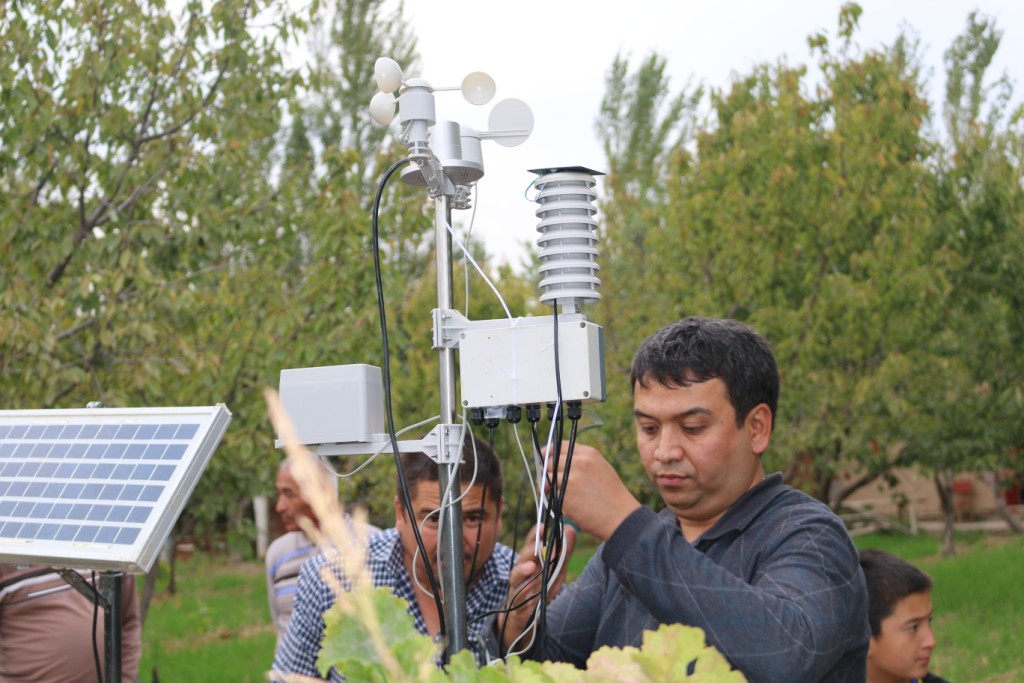A checklist for inclusive and green development in Central Asia
November 22, 2022

New activities, like horseback riding in the mountains, add higher value to tourism in Kyrgyzstan.
The shocks and aftershocks of multiple and overlapping crises—including the Covid-19 pandemic, crisis in Afghanistan, rise in energy prices and war in Ukraine—continue to shake the Central Asian region and its economies.
It is hard to run a businesses amidst these external shocks, impacts of climate change, and emerging trade and development challenges. How can we promote sustainable trade and build resilient, ‘forward-looking’ businesses with green-value chains and decent jobs?
Since 2014, the Aid for Trade project has been working with the private sector in Central Asian countries (Kyrgyzstan, Tajikistan and Uzbekistan) trying to do just that. We’ve evolved from supporting small-scale producers to improve the quality of their products and reach more markets to supporting system changes in trade governance and towards more sustainable economies.
We’ve framed our support on five features and values that make Aid for Trade transformative and impactful:
1. Openness to embrace the future
Agriculture, food processing and tourism all generate large numbers of jobs. By taking into account emerging megatrends such as healthy and ethical living, eco-behaviour and connected consumers, we can make those jobs (and products) higher value and more sustainable.
In agribusiness, for example, selling raw export products in bulk only creates low-paid jobs for farmers and primary processors. The big money is made abroad, where the exported raw materials are turned into more expensive products. We’ve supported Central Asian farmers and agri-processors to introduce innovative and higher value-added products themselves.

(Left) Our client Mevai Tilloi (Tajikistan) now produces healthy snack bars, increasing profit and employing more people, due to exports and access to high-end retail such as the hospitality sector. (Right) With improved skills in management, marketing and safety, grants to purchase new equipment, support to develop and test new tours, and networking to create stronger value chains, tourism providers in Kyrgyzstan have improved and expanded their options, including horseback and hiking tours in nature protected areas and experiencing the nomadic lifestyle in safe yurt camps.
It’s similar in the tourism sector. Many countries are not fully realizing their tourism potential, especially in terms of improving quality. By upgrading service skills and applying those same megatrends to travel offerings, they can attract visitors from major European and USA markets that are typically drawn by eco-, cultural and adventure activities.
Focusing on a narrower but superior market segment creates higher value, generating better than average returns and more stable and better paid jobs.
2. Information is gold
Producers can have the great products but they’re worth nothing without access to the right markets, at the right time, with the right quality and safety requirements. In Tajikistan, the Agricultural Market Information System brings agricultural and marketplace knowledge straight to farmers’ mobile phones.

Interface of the Central Asian Trade Information Portal.
With the International Trade Centre we developed the Central Asian Trade Information Portal, the first digital platform linking small and medium businesses with EU markets and beyond. As of June 2022, the platform has over 1,500 active users, predominantly from Central Asia but also from other countries such as USA, Turkey, China, Netherlands, UAE and India.
All this is to ensure that businesses do not miss any opportunities.
3. Efficient and “green” practices
In the Central Asia region, commodities such as energy, metals, minerals and cash crops make up more than 70 percent of the exports. These put significant pressure on the region’s delicate ecosystems, particularly water and energy resources, making the current level of growth and export not environmentally sustainable.
We promote measures to improve resource efficiency for businesses and farms, while reducing negative environmental impacts like soil erosion, agro-chemical pollution, and agricultural GHG emissions. This not only helps reduce the environmental footprint of production but also helps foster “green” exports, which reflect current megatrends. We are also working at the systems level to ensure green approaches are sustainable. In Uzbekistan, we supported the national adoption of the global Good Agricultural Practices (GAP) standard, paving the way to sustainable agricultural practices and better accessto certification for producers.

(Left) In Tajikistan, the first mobile laboratory for agriproducts advises small businesses and farms on how to treat and store their products to improve quality and safety, and ensures that the product is grown in compliance with sustainable practices and standards. (Right) In Uzbekistan, young scientists developed a precision farming tool which sends out SMS alerts to farmers about the spread of diseases and pests of plants.
4. Empowering women entrepreneurs and traders
Women are less represented in the global economy and struggle to harness the new trade opportunities such as e-commerce and regional and global value chains.
Supporting women entrepreneurship and employment remains central to our work. Applying a ‘gender lens’ is crucial to ensure that specific gender concerns are integrated into policy making and policy implementation. Our ‘women employment’ criteria evaluates a value chain or sector’s potential to employ or create jobs for women, guiding us on which chains and policy measures to support.
Mentorship programmes for business and trade development, networking and investment have been one important component in expanding the capabilities of women entrepreneurs and traders.
More than 10,000 women in the Central Asian countries have participated in mentorship, affordable finance programmes or other forms of support throughout the project.
5. Stronger together
It is impossible to achieve sustainable progress alone, which is why we support cooperation between trade policy makers, the private sector and national export promotion agencies. We also support regional partnerships between public and private sentities that help businesses get connected to regional and global value chains.
The Central Asian Working Group on Export Promotion of Agricultural Produce is one such regional initiative, supported jointly with our UNECE, GIZ and Hilfswerk International partners. Central Asian public and private experts supported by these partners worked together on quality standards, strategies and networking to improve cross-border networks across the Central Asian region.
To summarize it all in a checklist
Keeping these five values in mind, we move forward with the next stage of our Aid for Trade work, using this checklist to guide us in our support for ‘forward-looking’ businesses:
- Is the business or the value chain ‘green’? Is it concurrently good for the profit and for the planet?
- Can it survive the pressure of competition and changing customers’ needs?
- Does it produce good jobs and income?
- Is it inclusive for women, youth or, people from disadvantaged groups, and especially from remote areas where there are fewer options for employment?
- Is it synergetic with other development programmes and the government’s efforts?
If we can check our clients check these boxes, we can continue to help them, and the countries of Central Asia, ensure inclusive and sustainable growth.
The Aid for Trade project was launched in 2009, funded by the Government of Finland. Its current focus is on Central Asian countries, supporting the private sector in building ‘forward-looking’ and green productive capacities and creating decent jobs. Since 2014, the project supported the creation of 5,000 new jobs (including over 2,000 for women) in the region and US$600 million in export contracts.

 Locations
Locations